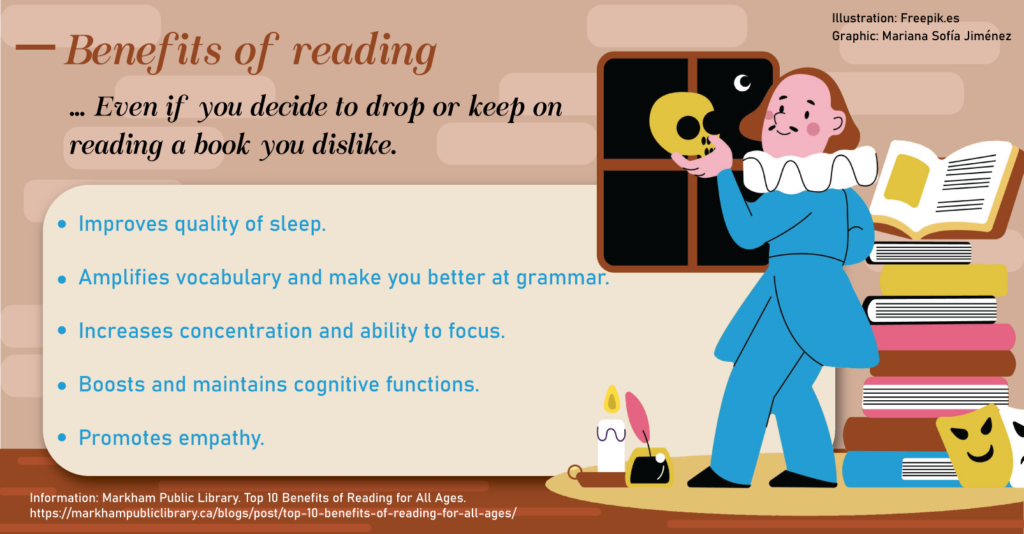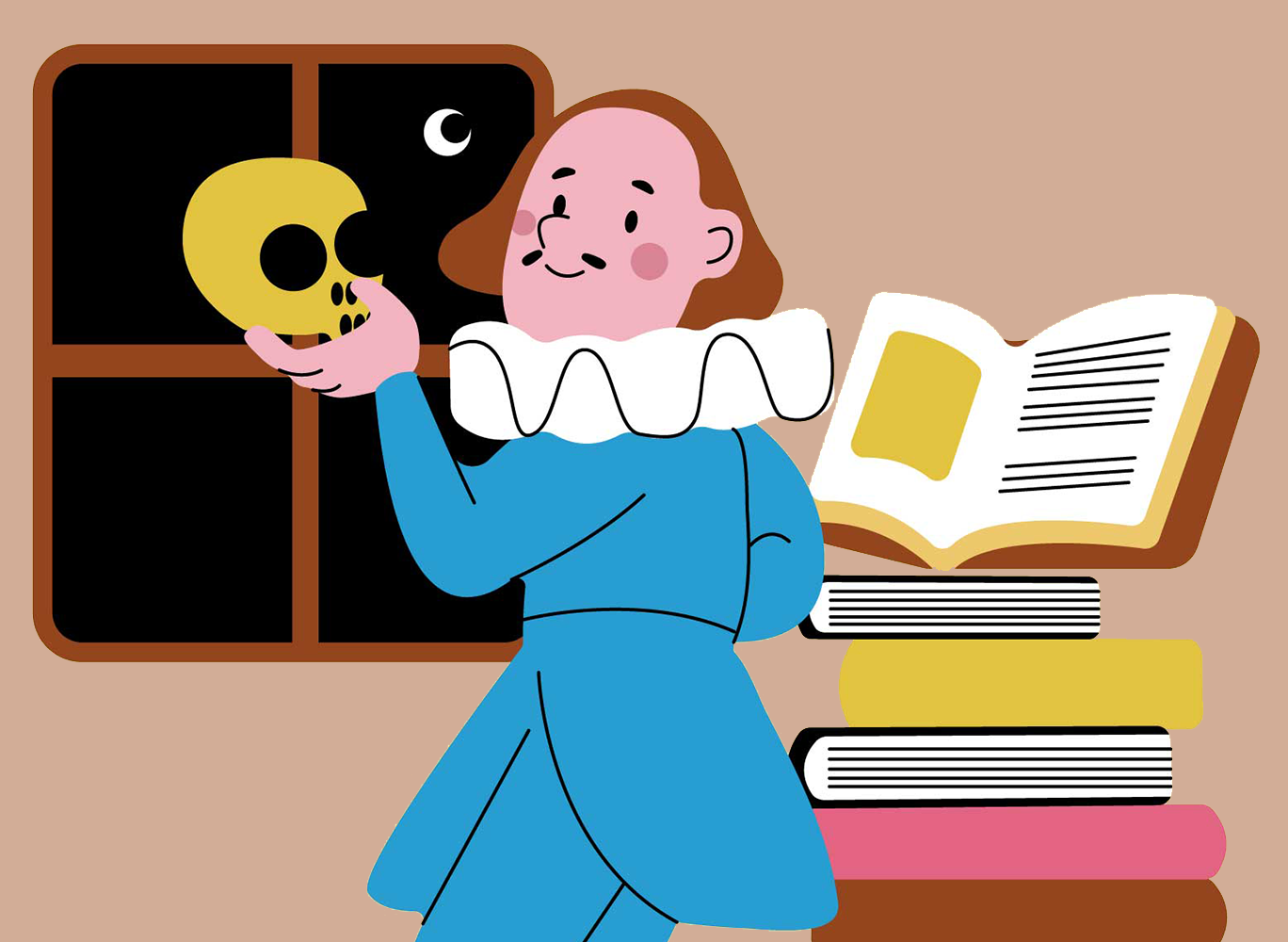We have all been in that situation where we can finally dedicate some time to reading: sitting on a comfortable couch with a hot cup of tea in hand, and finally, there’s peace and quiet at home. However, one significant detail can ruin this pleasant experience: you don’t like the book you’re reading.
Not enjoying a book is normal, and there is no rule governing what the best option is in this situation. Each person must assess the factors that most closely match their personality. Considering this personal decision would save time in continuously questioning whether to continue or stop reading a book and, thus, won’t slow down our reading habits.
Most people who read occasionally have been in a similar situation; consequently, there are different opinions. Despite reading a synopsis or taking a friend’s enthusiastic recommendation, there may be books that make it challenging to keep on reading just because we don’t connect or don’t like it. So, being readers and committing to reading, we ask ourselves, “Should I drop it or continue reading?”
Reading is essential in education and often part of thousands of people’s jobs, but it’s also just a hobby for others. A pastime should not be tedious or provoke negative feelings (considering that reading to get a passing grade or as a work requirement is another matter entirely). However, and most surprisingly, both decisions, whether to drop it or not, have their benefits.
What if I drop it?
In a world of expectations and perfectionism continuously displayed on social media, it could be shameful for some to drop the book you explicitly put on your reading list in that Instagram story and not finish it.
Making excuses, procrastinating, or avoiding the book you’re reading can be your signals to quit. The idea is for a book not to be an obligation but a recreational activity to relax, learn new things, or encourage reading habits. Especially if you’re starting to integrate a book into your routine, dropping it when you are struggling to continue is a good option; otherwise, forcing yourself can instill the feeling that reading is difficult and tedious instead of being a pleasurable activity.
During school, reading books is required to pass a course; however, it’s important to remember that as long as we read for pleasure, there are no repercussions if we set it aside. We can seek another book recommendation or move forward with that mountain of pending books sitting on the corner of your room and forget about the one we dropped, or perhaps pick it up in the future.
The idea is that a book should not interfere with your reading habits nor delay your reading progress. Remember that while you may not like your current book, the next one you read could thoroughly be a transformative experience you enjoy.
“With so many distractions and demands in our daily lives, reading is hard enough. The book you read should not make that effort any harder.”
– Ginni Chen.
What if I continue?
Perhaps you enjoy challenges. Even if it is difficult for you to persist in reading something you dislike, there is good news: you can still benefit from pushing on.
By continuing, you broaden your reading landscape to discover new ways of writing or scenarios you’re not used to. You even allow yourself to explore new genres where you will probably find other works in a style you like.
Patience is rewarding. By continuing, you strengthen your resilience to read works not to your liking and understand them, overcoming resistance to texts you find tedious. An example is a very long and boring essay or scientific research you must read for an assignment for school or work. Additionally, you may not like what you read at first, but as you progress, you can come across one intriguing chapter that makes the whole experience worthwhile.
Moreover, if this activity becomes a habit in your daily life, it will become easier to pass through the boring parts of a book because your tolerance and reading speed will eventually increase.
By reading works not to your liking, you learn about new genres, ways of writing, and authors. You also allow yourself to do a more in-depth analysis to understand how you critique a book according to an author’s writing style, values, and perspectives. When disagreeing, you can compare your ideals with those embodied in the work and understand why you disagree with the writer.
When reading, everybody wins!
Regarding both decisions, there is no right or wrong; what matters is to continue reading and remember that even if you decide to continue with a book or drop it for another, reading bestows many benefits. Some of them are:
- Expands vocabulary and improves spelling: Reading exposes people to new words and, therefore, positively impacts their vocabulary, spelling, and writing.
- Increases concentration and the ability to focus: Being accustomed to short videos and receiving information quickly, reading makes you practice concentration to stay focused for extended periods.
- Improves sleep: Reading is a relaxing activity; studies show that integrating it into your bedtime routine improves sleep quality.
- Books promote empathy: Getting to know new worlds, characters, and ideals makes people understand the situations posed in a literary work.
- Boosts and maintains cognitive functioning: Remembering details and situations in the book and imagining scenarios constantly exercises the brain.

Neither option is convincing enough? Writer Nancy Pearl recommends using what she calls the “rule of 50.” Read fifty pages of a book and then ask yourself if you are really interested in what is happening with the story and the characters, if you like the author’s writing, etc. If the answers to these questions are no, drop the book and begin reading something else.
In the end, the reader must make the final decision regarding abandoning a book or not. Each person must consider the benefits that most suit their personality. Just as there is a great diversity of books, there are also multitudinous ways in which people read.
It is worth mentioning that you please yourself and not others by reading. And while a friend recommends a book they like, their intention is for you to enjoy it and not the opposite; having different opinions is valid. It is important not to get carried away by others’ decisions. Choose what makes you feel best and helps you achieve your literary goals!
Translation by Daniel Wetta
This article from Observatory of the Institute for the Future of Education may be shared under the terms of the license CC BY-NC-SA 4.0 
)
)


)